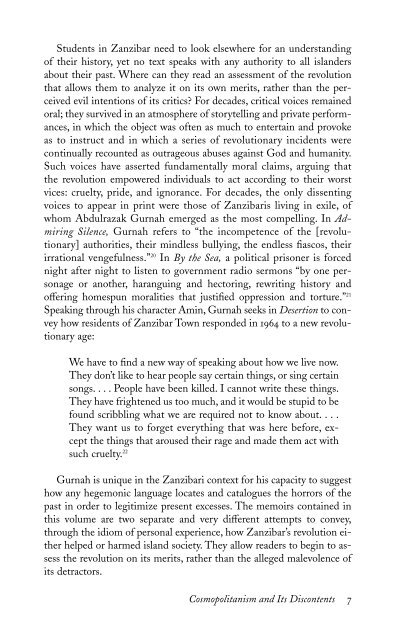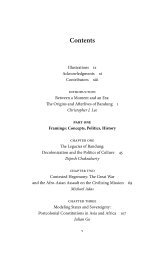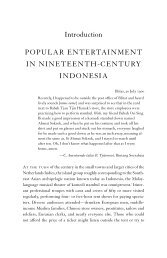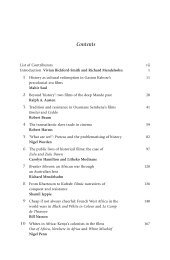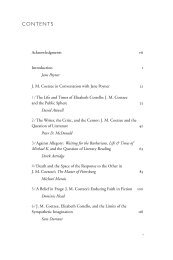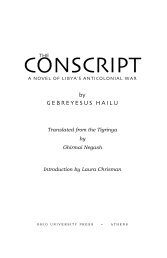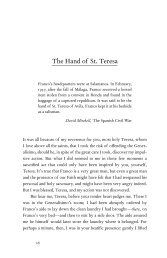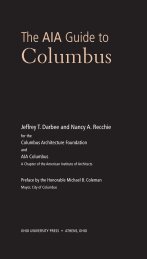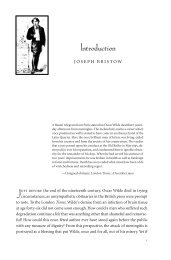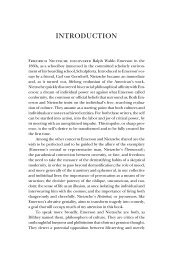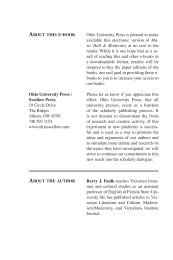Race, Revolution, and the Struggle for Human Rights in Zanzibar ...
Race, Revolution, and the Struggle for Human Rights in Zanzibar ...
Race, Revolution, and the Struggle for Human Rights in Zanzibar ...
Create successful ePaper yourself
Turn your PDF publications into a flip-book with our unique Google optimized e-Paper software.
Students <strong>in</strong> <strong>Zanzibar</strong> need to look elsewhere <strong>for</strong> an underst<strong>and</strong><strong>in</strong>g<br />
of <strong>the</strong>ir history, yet no text speaks with any authority to all isl<strong>and</strong>ers<br />
about <strong>the</strong>ir past. Where can <strong>the</strong>y read an assessment of <strong>the</strong> revolution<br />
that allows <strong>the</strong>m to analyze it on its own merits, ra<strong>the</strong>r than <strong>the</strong> perceived<br />
evil <strong>in</strong>tentions of its critics? For decades, critical voices rema<strong>in</strong>ed<br />
oral; <strong>the</strong>y survived <strong>in</strong> an atmosphere of storytell<strong>in</strong>g <strong>and</strong> private per<strong>for</strong>mances,<br />
<strong>in</strong> which <strong>the</strong> object was often as much to enterta<strong>in</strong> <strong>and</strong> provoke<br />
as to <strong>in</strong>struct <strong>and</strong> <strong>in</strong> which a series of revolutionary <strong>in</strong>cidents were<br />
cont<strong>in</strong>ually recounted as outrageous abuses aga<strong>in</strong>st God <strong>and</strong> humanity.<br />
Such voices have asserted fundamentally moral claims, argu<strong>in</strong>g that<br />
<strong>the</strong> revolution empowered <strong>in</strong>dividuals to act accord<strong>in</strong>g to <strong>the</strong>ir worst<br />
vices: cruelty, pride, <strong>and</strong> ignorance. For decades, <strong>the</strong> only dissent<strong>in</strong>g<br />
voices to appear <strong>in</strong> pr<strong>in</strong>t were those of <strong>Zanzibar</strong>is liv<strong>in</strong>g <strong>in</strong> exile, of<br />
whom Abdulrazak Gurnah emerged as <strong>the</strong> most compell<strong>in</strong>g. In Admir<strong>in</strong>g<br />
Silence, Gurnah refers to “<strong>the</strong> <strong>in</strong>competence of <strong>the</strong> [revolutionary]<br />
authorities, <strong>the</strong>ir m<strong>in</strong>dless bully<strong>in</strong>g, <strong>the</strong> endless fiascos, <strong>the</strong>ir<br />
irrational vengefulness.” 20 In By <strong>the</strong> Sea, a political prisoner is <strong>for</strong>ced<br />
night after night to listen to government radio sermons “by one personage<br />
or ano<strong>the</strong>r, harangu<strong>in</strong>g <strong>and</strong> hector<strong>in</strong>g, rewrit<strong>in</strong>g history <strong>and</strong><br />
offer<strong>in</strong>g homespun moralities that justified oppression <strong>and</strong> torture.” 21<br />
Speak<strong>in</strong>g through his character Am<strong>in</strong>, Gurnah seeks <strong>in</strong> Desertion to convey<br />
how residents of <strong>Zanzibar</strong> Town responded <strong>in</strong> 1964 to a new revolutionary<br />
age:<br />
We have to f<strong>in</strong>d a new way of speak<strong>in</strong>g about how we live now.<br />
They don’t like to hear people say certa<strong>in</strong> th<strong>in</strong>gs, or s<strong>in</strong>g certa<strong>in</strong><br />
songs. . . . People have been killed. I cannot write <strong>the</strong>se th<strong>in</strong>gs.<br />
They have frightened us too much, <strong>and</strong> it would be stupid to be<br />
found scribbl<strong>in</strong>g what we are required not to know about. . . .<br />
They want us to <strong>for</strong>get everyth<strong>in</strong>g that was here be<strong>for</strong>e, except<br />
<strong>the</strong> th<strong>in</strong>gs that aroused <strong>the</strong>ir rage <strong>and</strong> made <strong>the</strong>m act with<br />
such cruelty. 22<br />
Gurnah is unique <strong>in</strong> <strong>the</strong> <strong>Zanzibar</strong>i context <strong>for</strong> his capacity to suggest<br />
how any hegemonic language locates <strong>and</strong> catalogues <strong>the</strong> horrors of <strong>the</strong><br />
past <strong>in</strong> order to legitimize present excesses. The memoirs conta<strong>in</strong>ed <strong>in</strong><br />
this volume are two separate <strong>and</strong> very different attempts to convey,<br />
through <strong>the</strong> idiom of personal experience, how <strong>Zanzibar</strong>’s revolution ei<strong>the</strong>r<br />
helped or harmed isl<strong>and</strong> society. They allow readers to beg<strong>in</strong> to assess<br />
<strong>the</strong> revolution on its merits, ra<strong>the</strong>r than <strong>the</strong> alleged malevolence of<br />
its detractors.<br />
Cosmopolitanism <strong>and</strong> Its Discontents 7


